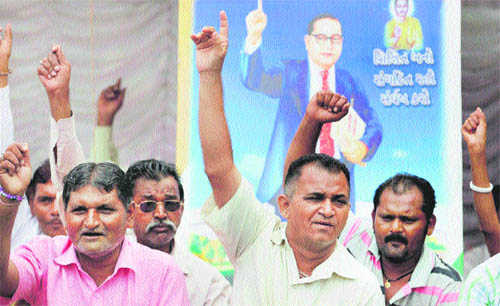
Enough: The young aren’t ready to put up with the humiliation their fathers suffered.
S Nihal Singh
THE ruling BJP did not invent anti-Dalit excesses but is responsible for what led to the Una atrocity for two reasons. First, the new political dialogue and rhetoric favour a jaundiced view of history and what the idea of India is all about. Second, the propagation of Hindutva, underpinned by the outrageous statements of supposedly responsible party functionaries, creates an atmosphere conducive to enforcing edicts on how one should live and eat.
Una struck a chord because of the nature of the lynching and thanks to the bravado of the perpetrators in filming their crime to burnish their credentials as sterling members of the cow protection group. The aggressive streak flows from the philosophy of the RSS in promoting its causes by the morning drill routine in contrast to the alleged softness of the long-ruling Congress.
Prime Minister Narendra Modi, himself an RSS product, usually quick to use Twitter for commenting on a variety of events, is more often than not silent on grave occurrences such as at Una. His apologists suggest that it is a “strategic silence” in order not to exaggerate an unfortunate incident, an argument few will buy.
Behind Mr Modi’s silence lies a philosophical and ideological dilemma. He believes in the sanctity of the cow and the RSS core belief of Hindutva, of all Indians being basically Hindus. Although as Gujarat’s chief minister he could set aside his beliefs, he climbed to power in Delhi on RSS shoulders and cannot go against his mentor, RSS chief Mohan Bhagwat.
On a practical level, the main BJP constituency chimes with the prejudices and caste segmentation of a majority of Hindus, particularly in rural areas, and their practice of untouchability. Part of the Modi government’s problem is that most of its leaders are home-grown products unfamiliar with sophistication and civil conduct and express themselves in expletives to bring down the level of political discourse.
Besides, an important part of the Dalit ferment we are experiencing in countrywide protests is due to a greater awareness of rights among the traditionally oppressed. The will comes at the cost of the BJP and to the benefit of the BSP of Mayawati. Some Dalits have chosen the mistaken path of suicide, but most are expressing their anger at a patently unjust tradition now undergoing pangs of change.
The ruling party has been particularly caustic in combating the Congress-promoted cause of secularism as it has come down to us through the independence movement. True, Mr Modi has been quick to appropriate icons of the past such as Mahatma Gandhi and Sardar Vallabhbhai Patel. In more recent times, he has even tried to appropriate the Dalit icon BR Ambedkar. But the new acquisition mocks the conduct of the Sangh Parivar and its cow protection units — witness the thrashing of two Muslim women in Madhya Pradesh for allegedly carrying beef.
Una in a sense marks a turning point in the long history of Dalit oppression. Graphic images of self-appointed judges mercilessly lynching four Dalit youths with gay abandon will stay in people’s minds for a long time. Apart from the political reverses this shameful demonstration of prejudice portends for the BJP in future elections, Una is a new badge of empowerment for Dalits.
How can the Modi government and the Sangh Parivar cope with the consequences of Una for governing the country? Plainly, Mr Modi and Mr Bhagwat need in-depth discussions to work a way out of their dilemma. Essentially, the problem boils down to the RSS tailoring its goals of promoting Hindutva to the compulsions of governing a diverse country. There is no point in blaming the police force for being mute spectators to such atrocities. It is in awe of the philosophy its new bosses are propagating.
There is no meeting point for a frank national debate because Mr Modi jumps into every state election campaign, often occurring in quick succession, to muddy the waters by hurling abuses at the Opposition, in the process sacrificing his image as a national leader. Nightly discussions on private television channels are often little more than shouting matches with partisan panellists guarding their corners.
Mr Modi is a man in a hurry because he is keen on gaining a majority in the Rajya Sabha in the shortest possible time. Perhaps the contradictory roles he has to play in state election campaigning while being prime minister is responsible for his support for the proposal to hold Lok Sabha and Assembly elections together. The Congress has now made explicit its warning that bashing it while seeking cooperation cannot go together.
Dalits have taken heart from the grounds well of opinion against blatant acts of discrimination. But long-practised prejudices take time to die. What has changed after Una is a new sense of Dalit resolve that they will fight the most egregious forms of prejudice. The young are no longer prepared to put up with the humiliations their fathers suffered.
Ambedkar dramatically symbolised his people’s protests by asking his followers to embrace Buddhism en masse. The fact that his grandson is repeating the call signifies the tenacious hold of Hinduism on even those at the receiving end.
Mr Modi has a Himalayan problem to resolve because the fate and longevity of his government are dependent upon negotiating a workable compromise with his mentor, the RSS. As the NDA nears its halfway mark, there is little time to waste.
The purist RSS argument is that the fate of a government is a short term reverse and ideals cannot be sacrificed. Those close to Mr Modi, men like party president Amit Shah would seem to think differently by suggesting a quarter century of Mr Modi at the helm.
The Prime Minister has to give thought to the country’s changing mood. If Hindutva forces run away with their idea of India, there would be ceaseless strife.



























